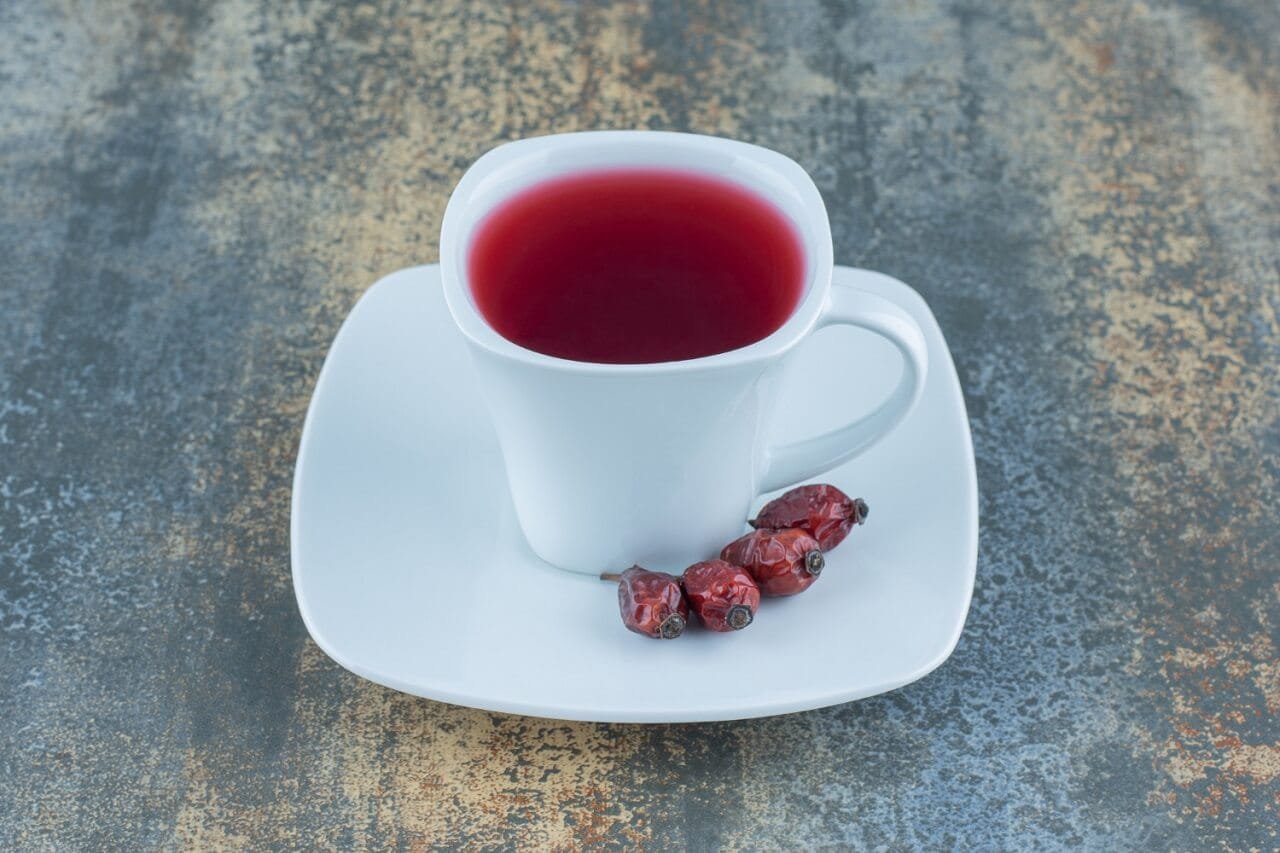Table of Contents
Rosehip tea is a delightful and healthful beverage made from the fruit of the rose plant. Known for its subtle, tangy flavor and a multitude of health benefits, rosehip tea has become increasingly popular among tea enthusiasts and health-conscious individuals. If you’ve ever wondered how to make rosehip tea from scratch or whether it’s good for you, you’re in the right place. In this guide, we’ll take you through the step-by-step process of brewing this antioxidant-rich tea and answer some common questions like, “Is rosehip tea good for you?” and “Is rosehip tea safe during pregnancy?”
What You Need to Know About Rosehips
Before we dive into the instructions on how to make rosehip tea, it’s important to understand what rosehips are. Rosehips are the fruit of the rose plant, typically forming after the flowers fade. They are rich in vitamin C, antioxidants, and other nutrients that contribute to overall well-being. Rosehips have been used for centuries in traditional medicine to combat ailments like colds and flu due to their immune-boosting properties.
Is Rosehip Tea Good for You?
Yes, rosehip tea is excellent for your health! This tea is a powerhouse of nutrients, particularly vitamin C, which is essential for immune health, skin health, and tissue repair. Here are some key health benefits of drinking rosehip tea:
- High in Antioxidants: Rosehips are loaded with antioxidants, which help neutralize harmful free radicals in your body and reduce oxidative stress.
- Anti-inflammatory Properties: Regular consumption of rosehip tea can help reduce inflammation, which is beneficial for people with arthritis and other inflammatory conditions.
- Supports Heart Health: The antioxidants and flavonoids in rosehip tea may support cardiovascular health by lowering blood pressure and improving cholesterol levels.
- Boosts Immune System: As a rich source of vitamin C, rosehip tea helps strengthen your immune system, making it easier for your body to fight off infections.
- Improves Skin Health: Thanks to its high vitamin C content, rosehip tea promotes collagen production, which helps keep your skin youthful and glowing.

With so many benefits, you can see why this tea has gained a reputation as a health booster. Now, let’s move on to the fun part—learning how to make rosehip tea!
👉 Brighten Your Day – Try Premium Rosehip Tea Now! 👈
How to Make Rosehip Tea: A Step-by-Step Guide
Step 1: Gather Fresh or Dried Rosehips
You can use either fresh or dried rosehips to make this tea. If you have access to rose plants, you can harvest the rosehips in the fall, when they are bright red or orange in color. If not, you can easily find dried rosehips in health food stores or online.
Step 2: Clean and Prepare the Rosehips
If you’re using fresh rosehips, wash them thoroughly to remove any dirt or pesticides. Cut the rosehips in half and remove the seeds inside, as they can be irritating to the throat. For dried rosehips, simply rinse them to remove any debris.
Step 3: Boil Water
Bring a pot of water to a boil. You’ll need about one cup of water for each tablespoon of rosehips.
Step 4: Add the Rosehips
Once the water is boiling, add the rosehips to the pot. If you’re using fresh rosehips, add about 2 tablespoons per cup of water. For dried rosehips, 1 tablespoon per cup of water should be enough.
Step 5: Let it Simmer
Reduce the heat and let the rosehips simmer in the water for about 10-15 minutes. This will allow the nutrients and flavors to infuse into the water.
Step 6: Strain the Tea
After the rosehips have simmered, strain the tea using a fine mesh strainer or a cheesecloth. This will remove the rosehip pieces, leaving you with a clear, delicious tea.
Step 7: Add Sweeteners (Optional)
Rosehip tea has a naturally tangy flavor, but you can add sweeteners like honey, agave syrup, or a slice of lemon if you prefer a sweeter taste.
Enjoy your freshly brewed rosehip tea!
Variations and Tips
- Add Spices: For an extra kick, add spices like cinnamon, cloves, or ginger during the simmering process. These spices complement the tartness of the rosehips beautifully.
- Rosehip and Hibiscus Tea: Combine rosehips with hibiscus for a tangy, bright-red tea that’s even more packed with antioxidants.
- Iced Rosehip Tea: Simply allow the tea to cool, then serve it over ice for a refreshing summertime drink.
👉 Tangy, Refreshing, and Packed with Goodness – Sip Rosehip Tea! 👈
Is Rosehip Tea Safe During Pregnancy?

Pregnancy is a sensitive time when many women are concerned about the safety of the foods and beverages they consume. One common question is, “Is rosehip tea safe during pregnancy?”
Rosehip tea is generally considered safe for most people, including pregnant women, but it’s always important to consult with your healthcare provider before introducing any new herbal tea during pregnancy. Here are a few points to consider:
- High in Vitamin C: Rosehips are incredibly rich in vitamin C, which is beneficial for the immune system. However, consuming excessive amounts of vitamin C can sometimes cause digestive upset, particularly during pregnancy.
- Potential for Allergic Reactions: Some individuals may experience allergic reactions to rosehips, especially if they are allergic to plants in the rose family.
- Consult Your Doctor: While rosehip tea can offer many benefits, especially in boosting your immune system during pregnancy, it’s essential to consult your doctor to ensure that it aligns with your specific health needs.
Most experts agree that drinking rosehip tea in moderation should not pose a risk during pregnancy, but personal medical conditions vary, so always err on the side of caution.
Possible Side Effects of Rosehip Tea
While rosehip tea is packed with nutrients, it’s essential to be aware of potential side effects, especially if consumed in excess. Here are some common side effects:
- Digestive Issues: Some people may experience bloating, nausea, or diarrhea if they drink too much rosehip tea.
- Allergic Reactions: Those allergic to roses or other plants in the rose family should avoid rosehip tea to prevent allergic reactions.
- Kidney Stones: Due to its high vitamin C content, excessive consumption of rosehip tea might increase the risk of developing kidney stones in some individuals.
👉 Feel the Floral Boost – Brew the Best Rosehip Tea Today! 👈
Final Thoughts
Rosehip tea is not only delicious but also offers a range of health benefits, from boosting your immune system to improving skin health. With its high antioxidant content, it’s a great addition to any tea lover’s collection. Now that you know how to make rosehip tea and understand its benefits, you can enjoy this delightful beverage with confidence. Just remember to consult your healthcare provider if you’re pregnant or have any underlying health conditions.
So go ahead, brew yourself a warm cup of rosehip tea, and enjoy its incredible health benefits!













